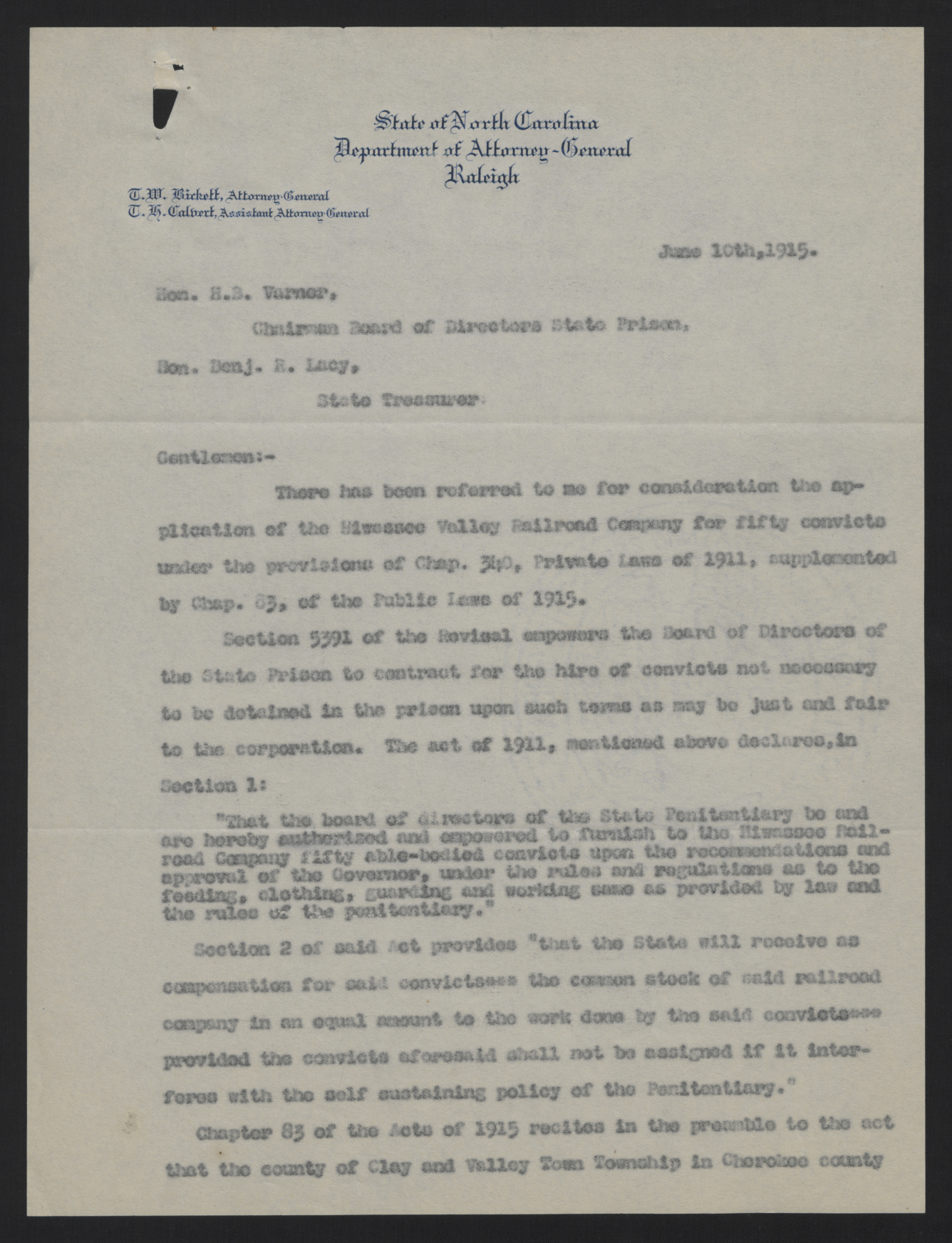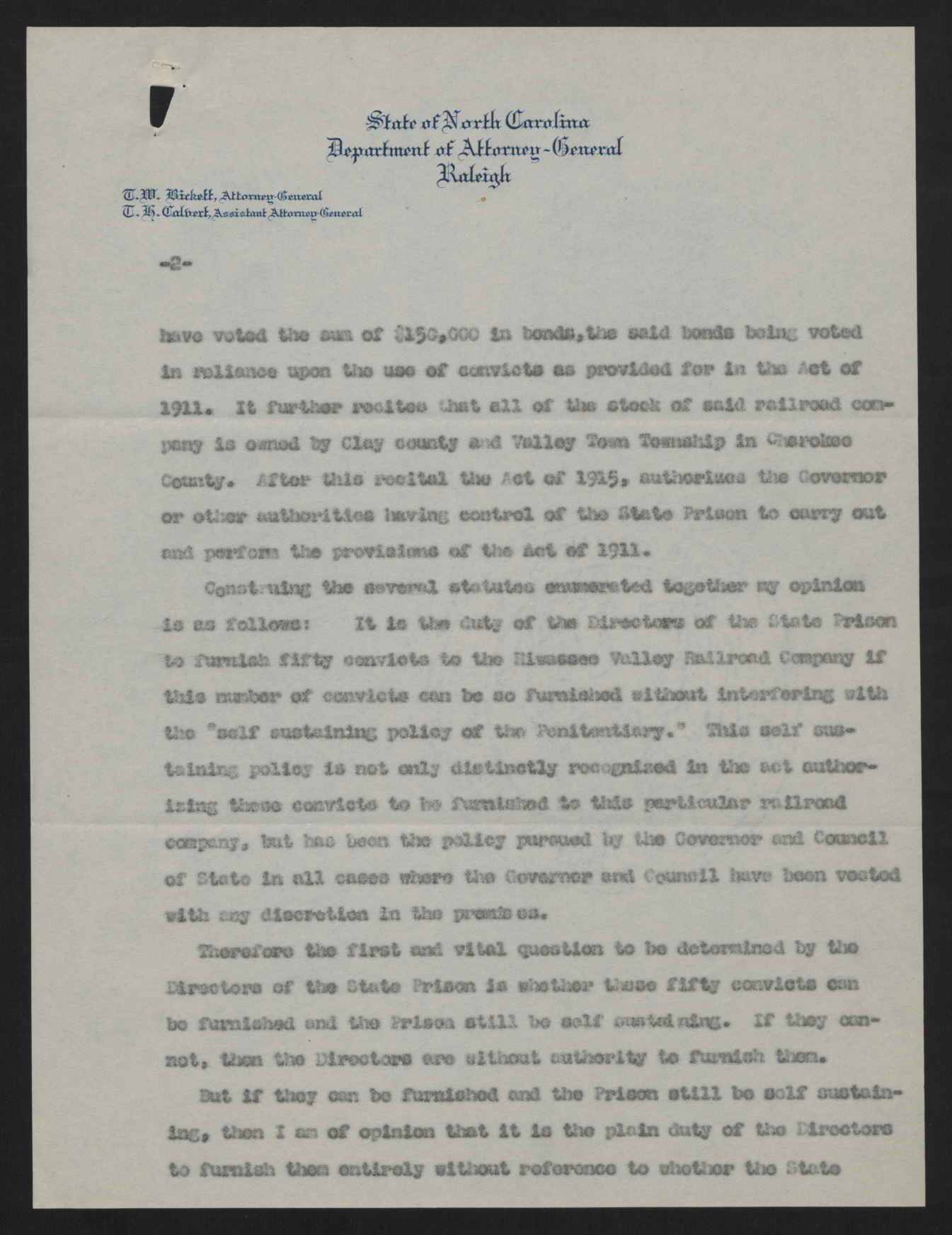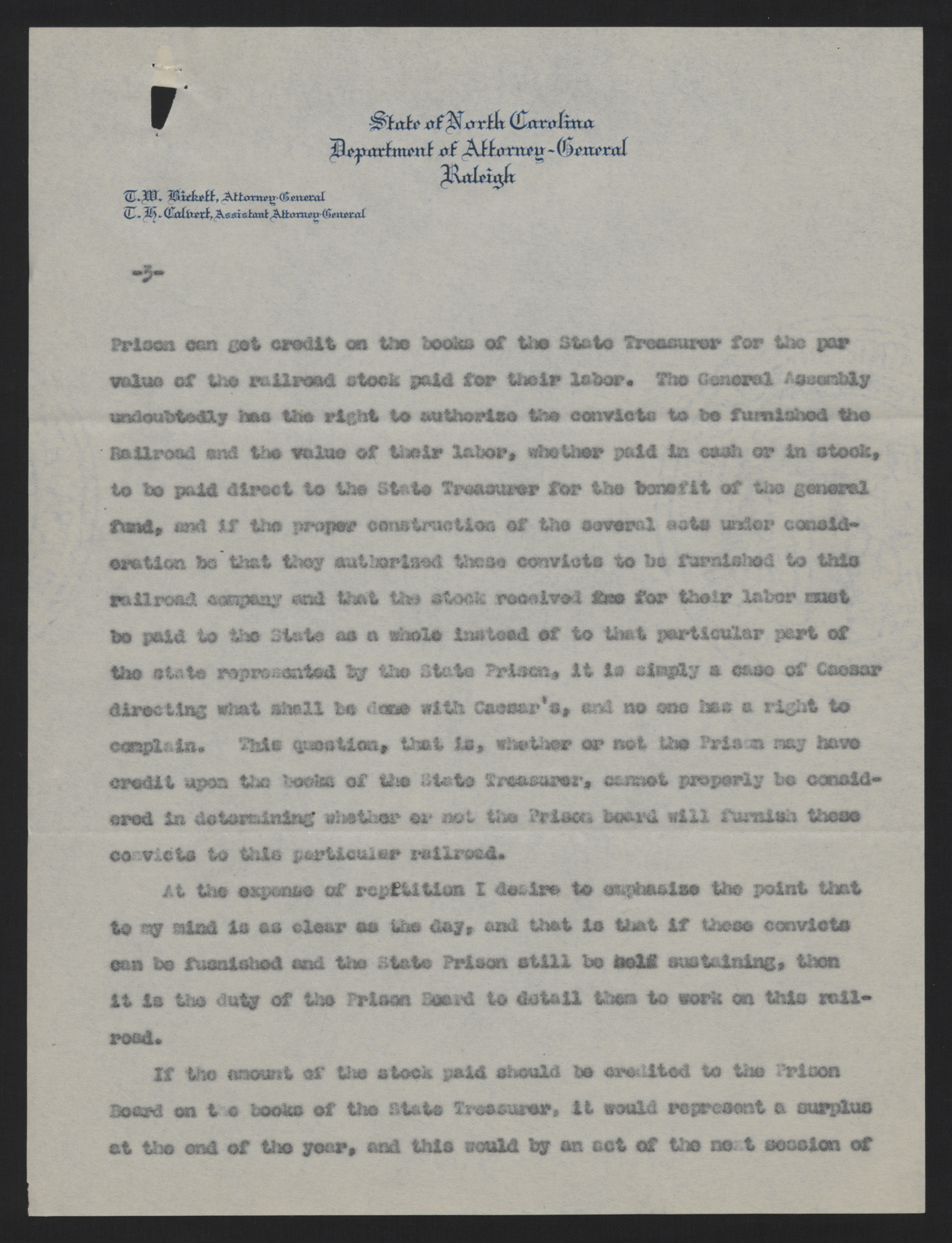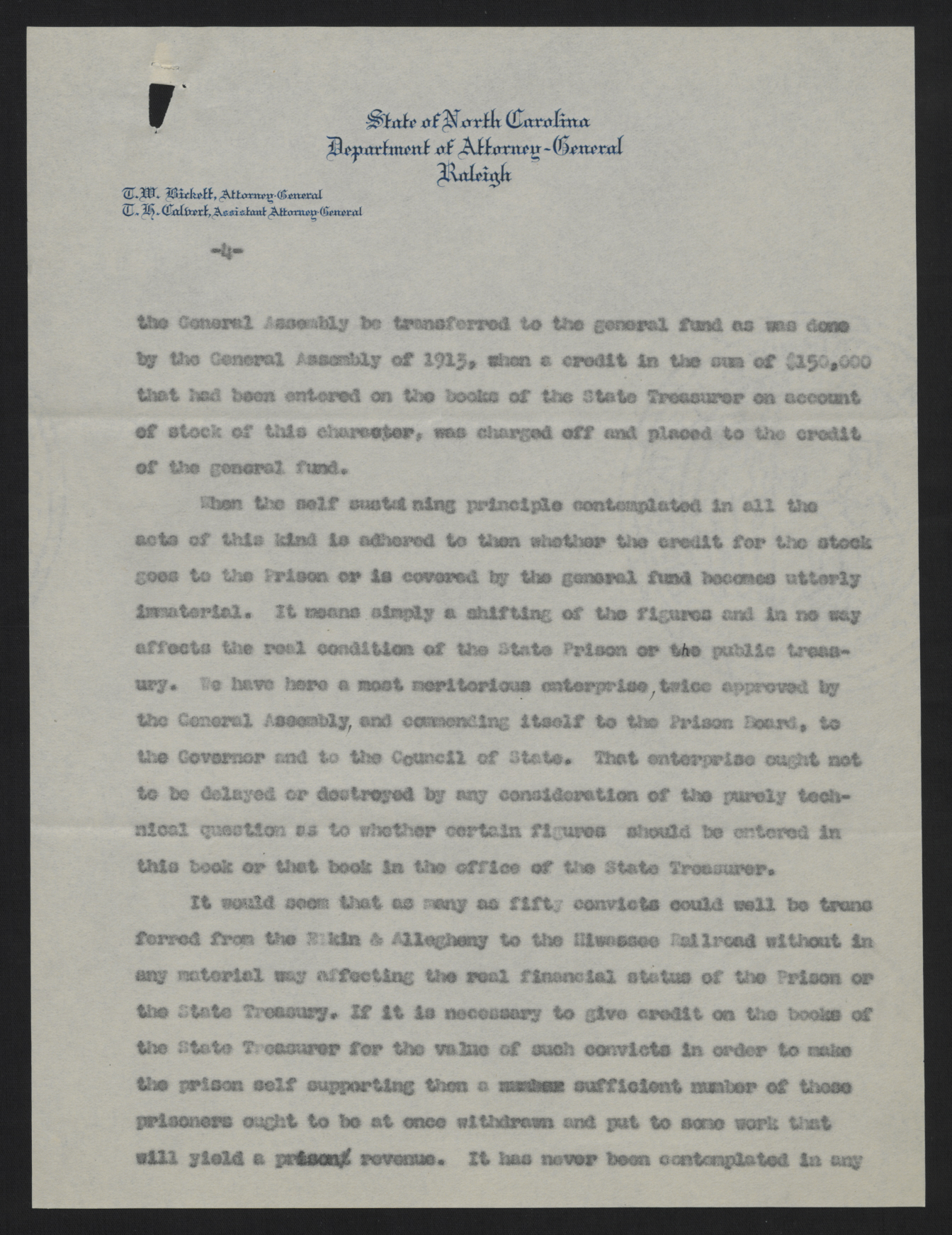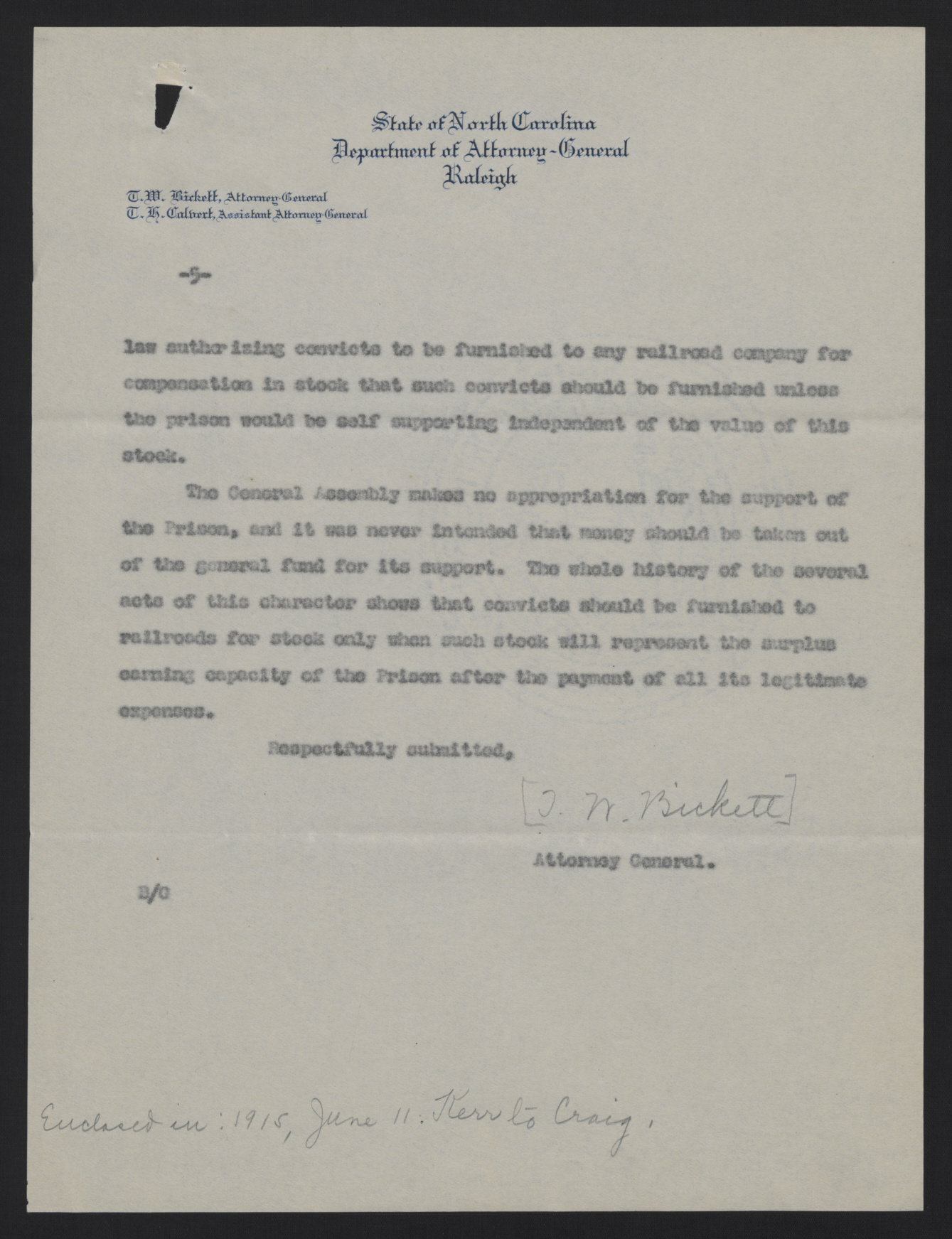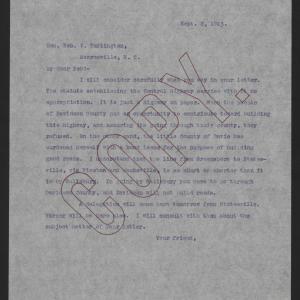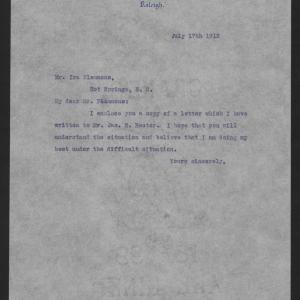State of North Carolina
Department of Attorney-General
Raleigh
June 10th, 1915.
Hon. H. B. Varner,
Chairman Board of Directors State Prison,
Hon. Benj. R. Lacy,
State Treasurer
Gentlemen:-
There has been referred to me for consideration the application of the Hiwassee Valley Railroad Company for fifty convicts under the provisions of Chap. 340, Private Laws of 1911, supplemented by Chap. 63, of the Public Laws of 1915.
Section 5391 of the Revisal empowers the Board of Directors of the State Prison to contract for the hire of convicts not necessary to be detained in the prison upon such terms as may be just and fair to the corporation. The act of 1911, mentioned above declares, in Section 1:
"That the board of directors of the State Penitentiary be and are hereby authorized and empowered to furnish to the Hiwassee Railroad Company fifty able-bodied convicts upon the recommendations and approval of the Governor, under the rules and regulations as to the feeding, clothing, guarding and working same as provided by law and the rules of the penitentiary."
Section 2 of said Act provides "that the State will receive as compensation for said convicts*** the common stock of said railroad company in an equal amount to the work done by the said convicts*** provided the convicts aforesaid shall not be assigned if it interferes with the self sustaining policy of the Penitentiary."
Chapter 83 of the Acts of 1915 recites in the preamble to the act that the county of Clay and Valley Town Township in Cherokee county have voted the sum of $150,000 in bonds, the said bonds being voted in reliance upon the use of convicts as provided for in the Act of 1911. It further recites that all of the stock of said railroad company is owned by Clay county and Valley Town Township in Cherokee County. After this recital the Act of 1915, authorizes the Governor or other authorities having control of the State Prison to carry out and perform the provisions of the Act of 1911.
Construing the several statutes enumerated together my opinion is as follows: It is the duty of the Directors of the State Prison to furnish fifty convicts to the Hiwassee Valley Railroad Company if this number of convicts can be so furnished without interfering with the "self sustaining policy of the Penitentiary." This self sustaining policy is not only distinctly recognized in the act authorizing these convicts to be furnished to this particular railroad company, but has been the policy pursued by the Governor and Council of State in all cases where the Governor and Council have been vested with any discretion in the premises.
Therefore the first and vital question to be determined by the Directors of the State Prison is whether these fifty convicts can be furnished and the Prison still be self sustaining. If they cannot, then the Directors are without authority to furnish them.
But if they can be furnished and the Prison still be self sustaining, then I am of opinion that it is the plain duty of the Directors to furnish them entirely without reference to whether the State Prison can get credit on the books of the State Treasurer for the par value of the railroad stock paid for their labor. The General Assembly undoubtedly has the right to authorize the convicts to be furnished the Railroad and the value of their labor, whether paid in cash or in stock, to be paid direct to the State Treasurer for the benefit of the general fund, and if the proper construction of the several acts under consideration be that they authorized these convicts to be furnished to this railroad company and that the stock received for their labor must be paid to the State as a whole instead of to that particular part of the state represented by the State Prison, it is simply a case of Caesar directing what shall be done with Caesar's, and no one has a right to complain. This question, that is, whether or not the Prison may have credit upon the books of the State Treasurer, cannot properly be considered in determining whether or not the Prison board will furnish these convicts to this particular railroad.
At the expense of repitition I desire to emphasize the point that to my mind is as clear as the day, and that is that if these convicts can be furnished and the State Prison still be self sustaining, then it is the duty of the Prison Board to detail them to work on this railroad.
If the amount of the stock paid should be credited to the Prison Board on the books of the State Treasurer, it would represent a surplus at the end of the year, and this would by an act of the next session of the General Assembly be transferred to the general fund as was done by the General Assembly of 1913, when a credit in the sum of $150,000 that had been entered on the books of the State Treasurer on account of stock of this character, was charged off and placed to the credit of the general fund.
When the self sustaining principle contemplated in all the acts of this kind is adhered to then whether the credit for the stock goes to the Prison or is covered by the general fund becomes utterly immaterial. It means simply a shifting of the figures and in no way affects the real condition of the State Prison or the public treasury. We have here a most meritorious enterprise, twice approved by the General Assembly, and commending itself to the Prison Board, to the Governor and to the Council of State. That enterprise ought not to be delayed or destroyed by any consideration of the purely technical question as to whether certain figures should be entered in this book or that book in the office of the State Treasurer.
It would seem that as many as fifty convicts could well be transferred from the Elkin & Allegheny to the Hiwassee Railroad without in any material way affecting the real financial status of the Prison or the State Treasury. If it is necessary to give credit on the books of the State Treasurer for the value of such convicts in order to make the prison self supporting then a sufficient number of these prisoners ought to be at once withdrawn and put to some work that will yield a prison revenue. It has never been contemplated in any law authorizing convicts to be furnished to any railroad company for compensation in stock that such convicts should be furnished unless the prison would be self supporting independent of the value of this stock.
The General Assembly makes no appropriation for the support of the Prison, and it was never intended that money should be taken out of the general fund for its support. The whole history of the several acts of this character shows that convicts should be furnished to railroads for stock only when such stock will represent the surplus earning capacity of the Prison after the payment of all its legitimate expenses.
Respectfully submitted,
[T. W. Bickett]
Attorney General.
B/G
Enclosed in: 1915, June 11. Kerr to Craig.

